Take Hawthorn as your control group. Even with the likes of Franklin and Hodge floating in and others like Crawford just a few years off their best football it was five years for them from 15th to a flag. Wait, in that case make it a decade for us. Thrilling stuff, bet you can't wait eh?
Well, if you're in the key Demonblog demographic (under 50, bitter and twisted) it may come as a surprise to you that it hasn't always been the case. In fact it has come to my attention that, and speak it in hushed tones, we used to be quite good. Can't actually imagine it myself but there you go.
I've been wanting to do this post for a while, and when Slattery Media sent me a copy of the covers of all our winning records to plug the 100th anniversary of the Footy Record and the release of a set of every Grand Final record ever printed I thought it was as good enough excuse as any to get on with it and commit our greatest triumphs to the historical record.
Now, as you might have gathered over the years I've not got a great deal of time for the modern day Record. I know who are our players are, I don't care who theirs are (and listen to the radio anyway) and the rest seems to be nothing more than a shiny endorsement of all that is great and good if the league agrees it is. Like the Herald Sun it's worth reading if somebody slings you a free copy but really you're only paying for it because you feel sorry for the acne ridden kid flogging it outside the ground - or need something to roll up and swat out with when things go horribly wrong. Midway through Round 2, 1999 I threw my rolled up Record off the back of the Waverley stairs. Bits of it are probably still floating through people's backyards in that new housing development.
It might not have met my needs since roughly the last time we were in a Grand Final but what the Record does do is provide a quality historical record of the game. It's near on impossible to find what you're looking for in an old newspaper without one of those bloody microfilm machines (which if you've never had the joy of operating I can tell you are almost the most non-ergonomicly designed devices ever invented) but after years of being hidden away the old copies of the Record are starting to become better utilised and easily accessible.
My adventures on Demonwiki have been aided to no end by the digitised collection of Records that the State Library of Victoria are currently uploading to their website. Alongside Google News Archive (now sadly near abandoned) the two have contributed enormously to the content on the Wiki - which as I will never tire of pointing out is the most comprehensive collection of info about this club that you'll ever find. Without the Record and News Archive it'd be a shell like most MFC related articles on Wikipedia.
As a fairly blinkered amateur historian I feel like it should be pointed out that if your interest lies in matches other than Grand Finals and you don't care for matches not involving us then you can get most of the Records for free in PDF form via the SLV but this new collection is obviously one for the collector with a serious interest in the wider history of the game or who just wants to show off. It's not cheap at $400 a shot but really if you've got the dosh 100 Records for $4 each is still better value than the $5 cover price it comes for now.
For my own personal needs I couldn't justify the $400 but I admit that it would be nice to actually hold the real record, admittedly a replica of, in my hands and look through it with a wider historical interest. To be honest of all the records available now on SLV I've never once looked at any of the finals not involving the MFC so god knows how many classic ads I'm missing out on.
So personally I'll stick to the free version (Dear Slattery, please don't make SLV take their copies down for this reason or I'll openly cry) but as an addition to a serious footy memorabilia collection you could certainly do worse. It's limited to a thousand copies though so do get in quick if you're keen. Also helps if you're not concerned that the only two times we feature in the last 45 odd editions is when we're about to be belted from pillar to post.
Usually I wouldn't involve myself in free commercial plugs - and indeed nobody would ask - but after eight years somebody finally acted as if Demonblog were a proper media outlet and not just a lone nutter with a keyboard so I'm happy to give them a free plug as the prelude to this The Pocket Guide to MFC Premierships segment (which doesn't actually fit in your pocket because I waffled so much before we finally got to it). Consider it an informercial.
1900
With the Record not published until 1912 we've only got newspaper evidence to tell the tale of the unlikely Fuschia flag. It was the first real premiership the club had ever won. They'd been acknowledged as the champion side of the colony six times before the formation of the VFA, but with the coming of an organised competition for the first time they managed to be runners up four times but not much else other than a brief flirtation with liquidation in the early 1880's.
Luckily success was not a pre-requisite to enter the VFL when it formed, and the chance to bring the mighty MCG into the new league's fold outweighed any concerns the other clubs might have had about the lack of recent success or a proper geographical base.
In an early sign that you can't please anybody when you're a sports administrator the VFL came under heavily criticism for their finals series format from which the sixth placed Demons manage to win through to the Grand Final.
Perhaps they had a point, it seems almost wacky now play an entire season just to effectively decide seedings amongst the teams who didn't finish first. As was the custom at the time Fitzroy went straight to the Grand Final, regardless of what happened in the sectional rounds and would have won the flag outright if they'd topped their group. Luckily for our history, and the frayed nerves of the fans who had watched us win nothing for a quarter of a century (which almost sounds like a good deal now), they finished second to Essendon in their group and kept the season alive.
Against the odds the Fuschias won their section on percentage from Collingwood and were pitted against the Same Olds for the right to meet the Maroons in the final. Melbourne triumphed narrowly in the Semi Final to make the first of 18 Grand Finals in the club's history.
Despite the farcical nature of deciding who would play the match caught the attention of the public who showed up in numbers almost six times larger than the year before. The idea of Grand Finals was starting to catch on after years of handing premierships to the side who finished on top, and we are much richer for that now. Until they turn it into a top 15 and making the finals becomes meaningless. Much like it was in 1900. So, perhaps a good thing for us.
Arthur Sowden, Eric Gardner and Bill Bowe were missing from Melbourne's best lineup, but they scored first through a behind to Dick Wardill after he had won the toss and elected to kick with a slight breeze.
The Maroons got the first goal, and early on the match was played just as you'd expect it to be with such a gap between the two sides throughout the season. Somehow, despite being vastly outplayed for most of the term Melbourne took advantage of the breeze to sneak a slight lead into quarter time after Jack Leith and Tommy Ryan goalled.
Into the wind in the second Melbourne failed to register a major, but luckily for them Fitzroy only got one themselves. The game had tightened up noticeably but was still marred by scrappy disposal.
A two point lead to the Maroons at half-time seemed like a prelude to them taking over, they had been strong finishes all year, and soon enough the scores were level. Melbourne though were defiant and pushed ahead when Wardrill got his second goal of the match. Stewart Geddes kicked his first, and despite a mountain of attack Fitzroy couldn't penetrate the Melbourne defence and the unthinkable was on the brink of happening. Melbourne by 13 at three-quarter time.
The Maroons opened the last quarter with two missed shots, and with the use of the wind it looked briefly as if they were going to run over the top. The defence again held-firm though, and although they conceded a goal to bring the margin to under one straight kick it was not the sort of match where another goal was readily on offer. Melbourne held on and despite two goalless quarters they had won their first premiership. Fitzroy's carriages - left outside the ground already enscribed with PREMIERS 1900 - returned to a funeral like atmosphere at Brunswick Street oval while Melbourne players celebrated an unlikely but hard fought first VFL premiership.
Best were Langley, Wardill and Purse. Cumberland and Herring were also prominent.
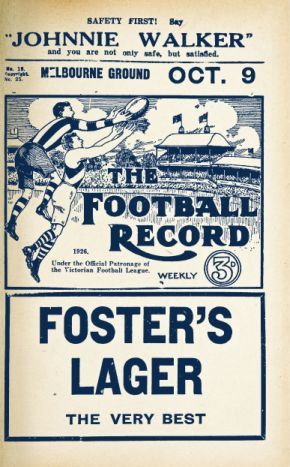
1926
26 years after their first premiership, the Fuschias finally broke through for another. After many years of struggle following their first flag World War I had cruelly put the Redlegs out of action just as they qualified for a rare finals series in 1915 and by the time they came back in 1919 the club's stocks had been destroyed and they went through the season winless.
It took until 1924 to qualify for the finals again, a year after only avoiding the wooden spoon on percentage, and by '26 they were in their third straight September series and primed for a run at the Grand Final on the back of Ivor Warne-Smith having just taken home the club's first Brownlow Medal.
Captain-Coach Bert Chadwick pulled off a selection shock, picking Francis Vine for his first career match to replace Bob Corbett who had suffered a broken jaw in the three point Preliminary Final victory.
Matched up against a Collingwood side they had already beaten in the Semi Final they also boasted the first side to have three different players kick 50 goals in a match. The contrast to the battling team who lucked their way through to the Grand Final in 1900 was extreme, this was the first real champion Melbourne side.
Melbourne won the toss and goalled first through Bob Johnson, who had three by quarter time to help his side to a handy lead. It looked like they might run away with the game from there but the Pies stayed strong and hit back to be within striking distance at the long break.
With Syd Coventry thrown to quiet the dangerous Johnson, Melbourne still managed to provide multiple avenues to goal courtesy of Moyes and Duff, running the Pies off their feet. Moyes got two of his goals in quick succession and by the time the third quarter ended the match was as good as over.
Gordon Coventry broke the VFL season goalkicking record in the last term but his side were already well and truly buried. At the other end Johnson was unbeatable, except by his own boot, kicking 6.7 in a best on ground performance. The Australasian newspaper described his performance by saying "He soared in the air like a bird, marked magnificently and uncannily, and kicked six goals". It was his goal three minutes into the last quarter which put the result beyond doubt. The final score of 17.17 was a record score in a Grand Final for its time.
One of the interested spectators was Henry Harrison, first captain of the club in 1859 just days short of his 90th birthday. Also present was 1900 premiership player Dick Wardill.
In addition to Johnson, Wittman and Moyes were also amongst the best.
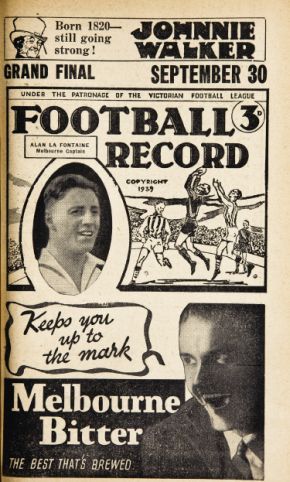
1939
Melbourne had thumped the Pies by 92 points earlier in the season and qualified for the Grand Final by beating them in the Semi Final, so despite Collingwood's thumping victory over St. Kilda in the Preliminary Final and Ron Todd's 11 goals, the Demons still went in as red hot favourites.
Todd loomed as the biggest danger to Melbourne's third premiership, having kicked more than a hundred goals for the season, and when Collingwood started the game with a six goal first quarter it looked as if as an upset was in the making. Seven goals in the second quarter helped Melbourne back into the game, taking a four point lead at the long break which would have been even more if they hadn't been robbed out a goal when Umpire Coward broke his elbow and was unable to provide an all-clear sign. Despite the controversy the umpire's misfortune was eventually to Melbourne's benefit as they booted three quick goals after the break for him to be exchanged for the emergency.
The comeback at the end of the second quarter killed the Magpie challenge, and the second half became a procession. The first three goals of the third quarter, and a five goal to three total quarter gave Melbourne the advantage entering the last but it was the seven goal to one avalanche there that made the result one side. The Pies were reduced to 16 men in the final term and the Demons took advantage by racking up the then record score in a Grand Final en route to their third flag.
Best for Melbourne were Beames, Roberts and Anderson. Norm Smith kicked 1.6 and Alby Rodda 4.5.
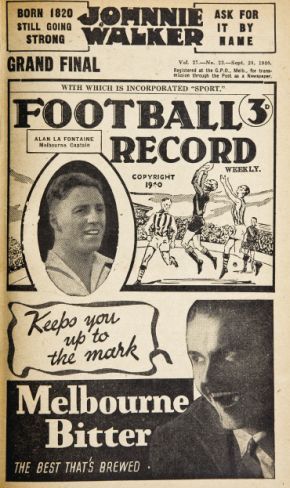
1940
You're not seeing things, they did use nearly the exact same design for the front cover two years in a row. I guess they thought nobody would notice, and for the best part of 70 years they were probably right.
The Melbourne Football Club too were up for a repeat, taking their second consecutive premiership and the first repeat success for the club since being named Challenge Cup winners from 1868 to 1870.
After their big loss in the previous year's decided Collingwood had fallen by the wayside, missing the finals, and were replaced as challengers by Richmond.
The defending champions had finished the season two games clear of the Tigers at the top of the table, but were shocked by them in a brutal Semi-Final. They struggled to a five point victory over Essendon in the Preliminary Final and went into the premiership decider as underdogs.
Suffering from a rash of injuries, Checker Hughes gave his team a light week of training and was forced to go back to the drawing board for tactics that would get the job done against the Tigers second time around. He set Jack O'Keefe to tag the deadly Richmond captain-coach Jack Dyer in the ruck, and it was a winning move. Dyer had been at his rampant best in the Semi, seriously concussing Norm Smith and injuring several other Demons but the champion police boxer kept him in check and Smith booted seven.
12 scoring shots to three in the first quarter put the Redlegs in the box seat, but after kicking the first goal through Baggott their abysmal kicking for goal was good for just 4.8 and left the Tigers in the hunt. By half time, though, they had been blown away, not only did O'Keefe negate "Captain Blood", but he managed two goals in the term and the margin had blown out to 45 points. The premiership was as good as theirs. One player not celebrating was Ray Wartman who was injured during the first quarter and replaced by Ron Barassi Sr, playing what would ultimately be his last match.
Despite hitting the post twice in the third term, Norm Smith added two more of his seven and the lead become unassailable. Melbourne's first premiership repeat was confirmed, and despite Jack Titus kicking his 100th of the season it was too late for the Tigers to do anything but boot a few consolation goals in the final term when the match was already won.
Best were Beames for the second straight year, Baggott and LaFontaine while Smith was presented with a gold medal by the vice-president of the club for his performance.
In honour of the victory Keith 'Bluey' Truscott penned a new verse for the theme song,
Now the Tigers they are haughty in the year 1940
But the Demons would not be licked
And we found them ahead at the final bell,
With the spirt of twenty six
The verse was later updated to become the official, but rarely used, second verse of the Demons theme.

1941
Slight changes to the design of the record, but they were still running with that same shot of Allan La Fontaines. And why not, he was shooting for the league's second premiership hat-trick.
In a season where the league was ravaged by players being called up for military service, the Demons missed a number of first choice players on Grand Final day. They also had their issues with injuries. In all they were without 12 players while the Bombers were nearly at full strength and for that reason started favourites despite finishing a game behind the Demons in fourth. Both teams had beaten minor premiers Carlton to qualify for the final
On an unnaturally warm September day the Bombers opened with the first goal but from then they were beaten solidly. The favourites were shocked by a full-frontal attack by their opponents, they were dominated in the ruck and went into the first break 35 points behind with their skills in tatters with a massacre on the cards.
Any hope that Essendon would recover and make a contest out of the match were ruined when they suffered a five goal to one second quarter, kicking themselves out of the match with 1.5. By half-time it was 57 points, and despite a brief rally by the Bombers in the third term (and a 52 to 20 free kick count) the Demons went on to win the game handily.
Inspired by captain-coach Dick Reynolds the Bombers fought it out with seven goals in the last term to reduce the margin from 47 to a more respectable 29 points but the Demons were already playing like the celebrations had begun and it was all too late. It was the Demons fifth premiership triumph from five Grand Finals.
Best were Beames, Lock, Heal, Mueller, Dullar, La Fontaine. Stan Heal returned to Western Australia the next week to play in a WAFL premiership for West Perth.
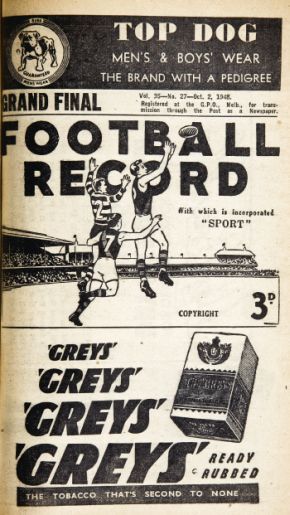
1948
The ravages of the war eventually caught up to the Demons and it took them another seven years to regroup and make another Grand Final, and they got two for the price of one.
Having lost twice to Essendon throughout the season, and again in the finals, the Demons started long shot underdogs for the Grand Final and there's no doubt they should have lost, but in the end they found themselves blowing a golden chance to win. The celebrations for the sixth premiership had to wait another week.
When captain Don Cordner met his Essendon counterpart Dick Reynolds for the coin toss in the middle of the MCG he said "this is it", to which Reynolds replied "unless it's a draw". The Bombers went on to dominate the Demons but kick themselves out of contention like no other team in Grand Final history.
Melbourne did well to lead at quarter time, let off the hook but Essendon kicking six behinds without a major, and the Bombers dominated the second term as well but could only add 2.9 and despite their dominance went into the long break behind.
The favourites straightened up, relatively speaking, in the third quarter and added 4.6 to retake the lead going into the last quarter. The match might have been over had it been not for their abysmal goalkicking. Full forward Bill Brittingham the worst offender with 2.11 on a day where one straight kick out of 11 might have won his side the flag.
A Norm Smith drop kick from 50m out in the last quarter tied the scores, and despite Essendon's dominance in scoring shot they were just one point away from defeat. In the end Melbourne could even have won it there and then, Smith playing on from a set shot 45 metres out and failing to score. From the resulting boundary throw-in Don Cordner attempted to fist the ball through for a point but collided with Smith and gave the Bombers a second life. He was about to collect the ball again when he slipped.
It would have been unfair, but nobody on the red and blue side was complaining. When the siren went just seconds later the fact that they managed to snatch a draw was remarkable enough.
Best for the Demons were Alby Rodda, Smith and Collins. Rodda suffered a broken rib.
The two sides reconvened for the replay a week later, delaying Checker Hughes' second retirement by a week. Melbourne went in knowing they'd been let off the hook by their opponent's poor kicking in the first game and that they'd have to improve to avoid their second Grand Final loss in history.
It had been a difficult week for the Bombers. They had shown up to Windy Hill for training only to find out that the cricketers had already taken over. Ferried to Arden Street in a fleet of taxis it was no way start a Grand Final week even if they had just been through one.
This time Melbourne were taking no chances on a thrilling finish and in wet conditions they blew Essendon away in the first quarter, taking a 35 point lead into the first break. Every key Bombers man was silenced and the match was all but over.
Dick Reynolds was forced to move into the ruck to spark his side, but Col McLean looked after him and despite Essendon kicking five goals to three in the third quarter they never got close enough to threaten. Melbourne added just four points to its first quarter lead but it was enough.
Jubilant supporters donated 200 pounds to the team for their victory, including 20 from former winger Ray Wartman who had seen his own Grand Final ruined by injury in 1939.
Jack Mueller, lured out of retirement before the finals, booted another six goals to take his tally to 20 for the series. Smith, Mueller and Bickford were Melbourne's best.
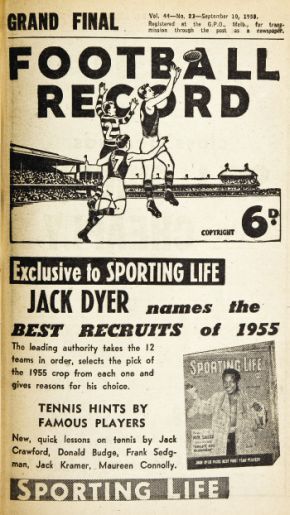
1955
Since the 1948 triumph the Demons had been forced to undergo an extensive rebuild, eventually leading them to the 1954 Grand Final where they were easily beaten by Footscray for the Bulldogs one and only premiership triumph.
Best on ground in his last MFC game in the 1948 replay victory, Norm Smith was now in charge and Collingwood stood between him and his maiden coaching premiership after four as a player. It was just two years since the Demons had finished second last on the league ladder and the speed of the rebuilding job made the successes that were to follow even more impressive.
Having already taken care of the Pies in the Semi Final, the Demons went into the premiership decider as favourites. Nevertheless the Pies had been the first team to beat Melbourne that year in Round 11 so couldn't be entirely discounted.
In a stark contrast to their Semi Final, the Grand Final was played in glorious sunshine. The Pies goalled first from a downfield free kick after Noel McMahen had ironed out Bob Rose. Checker Hughes had always stressed that when playing Magpies, "Once Collingwood starts handball, meet the player with shirtfront football", and the 1955 side had taken that age old concept to heart. It cost them a goal but the black and whites were on the back foot from them.
Incensed by the incident the Magpies players went in harder, but their physical exertions only served to highlight the bumps they'd taken in two gruelling games to qualify for the grand final. When the sting went out of the physical action Melbourne hit back to take the lead, and were a point in front at the first break having weathered the storm.
The Demons should have blown their opponents away in the second quarter but managed just 1.7. If it wasn't for the resiliency of the Collingwood backline they may have had even more shots on goal but were wasteful. The only saving grace was that at the other end the Magpies were doing nothing. They went from the ten minute mark of the first quarter to midway through the third without kicking a goal. Still, at the long break it was just 11 points the difference and they were still in the hunt.
The third quarter saw the Pies claw back a few more points, but the 88,000 fans were still no closer to an answer about who would win. They had taken full advantage of Demon inaccuracy to cut the margin to just seven points at the last change thanks to late goals to Rose and Smale.
With the match in the balance and the Magpies finally looking threatening again after so long without a goal in the middle of the game it was anybody's premiership as the last quarter started but early goals from Bob Johnson and Bob McKenzie early took the wind out of the Pies again and Melbourne never looked back.
Late in the game, with the Demons seemingly having the flag won, Frank "Bluey" Adams, Melbourne's 19th man, was introduced to the match to replace the injured Geoff Case. He sprinted off the interchange bench and collided with Collingwood's Des Healey. Both men were knocked unconscious and Adams' Grand Final lasted just 45 seconds. He would always maintain that he had no memory of the clash and that the last thing he could remember was was getting ready to run out onto the ground.
It was a victory for youth. Twelve premiership players were not yet 23-years-old.
Denis Cordner was the Demons best, dominating the ruck in the second half. Barassi and Melville were also prominent.
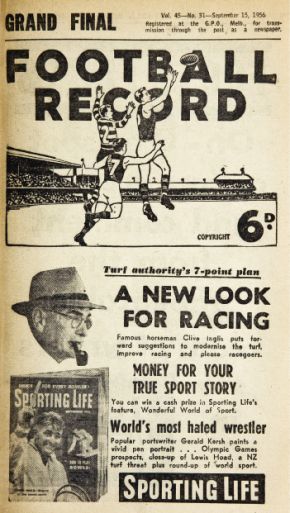
1956
The city of Melbourne was in the grip of sports fever in the Olympic year, and just over 116,000 people officially saw the Grand Final with many others climbing roofs or leaping over turnstiles to see the match.
In front of the massive crowd Norm Smith's Demons went in favourites, having beaten Collingwood in the last round of the Home and Away season as well as the first week of the finals. With a week off they'd been able to sit back and watch the Pies battle it out with Footscray for the right to play in the final.
Collingwood took a narrow lead into the first break but it wasn't to last. The soon to be two-time premiers out-matched their opponents in skill and ability, taking the lead into half time and never looking back. Four goals to one in the third quarter gave them a comfortable lead and the last was a rampage, with Collingwood conceding seven goals - including three to Athol Webb - as Melbourne sealed their status as one of the greatest teams in VFL history.
Keith Carroll suffered a broken nose and concussion after being struck with an elbow in the second quarter. He was already being operated on by the time the game ended but was one of the only losers on the Demon team that day. Every Collingwood player was beaten in his position and Melbourne dominated from then on. Denis Cordner dominated the ruck, and Laurie Mithen was brilliant at ground level.
Stuart Spencer was best on ground with his powerful roving, also adding five goals in what would prove to be his last VFL game. Ron Barassi and Ken Melville were also amongst the best. Noel McMahen and Denis Cordner also played their final VFL match.
Unsurprisingly for such a large crowd the match grossed an all-time VFL record crowd and gate receipts to match - raising 19,718 pounds.

1957
The 1957 Demons weren't as dominant as they had in previous years, losing five times throughout the year, but in an even season it was still good enough for the minor premiership.
Essendon beat them by 16 points in the Semi Final, pitching Melbourne into a Preliminary Final against finals debutantes Hawthorn. A 68 point victory qualified the Demons for the Grand Final and a second crack at the Bombers.
They had been accused of over-confidence in their first meeting with Essendon, but any hint of cockiness this time around had been replaced with steely determination. Ron Barassi booted the opening goal after 13 seconds and by the end of the first quarter they had put on six goals. At half-time the margin was 35 points and the match was all but done.
Despite several injury problems (John Beckwith had barely been able to run in a secret fitness test that morning and Keith Carroll was replaced with a thigh injury during the second quarter) the damage had already been done. The Bombers broke even in the third term but stopped cold in the last and suffered a 61 point loss. For the second time in Melbourne's history they had won three flags in a row, putting this group on the same level as the 1939-1941 side who had been torn apart by the war. The common denominator between the two was Norm Smith, now confirmed as one of the great coaches of all time.
Best were Barassi, Robert Johnson and Fenton-Smith

1959
Shocked by the Magpies in the 1958 decider when red-hot favourites, Melbourne's bid for four premierships in a row became a bid for four in five seasons when they lined up a year later.
Stung by their defeat the year before the Demons put in a strong 1959 season to finish as minor premier for the fifth time in a row, confirming their status as hot premiership favourites when they thrashed the second placed Carlton by 44 points in the Semi Final. Essendon had knocked Collingwood out in their elimination semi, depriving the football world the much awaited Grand Final rematch. It was generally expected that they would fall to Carlton in the Preliminary Final but when the Blues were knocked out in straight sets the Bombers instead created a replay of the 1957 decider.
The first quarter gave no indication that the Bombers were going to lie down. They used their pace to dominant procedings, but reminiscent of 1948 kicked poorly and only led by 13 points. Norm Smith, realising that his side was in danger of being burnt off by their pacy opponents, instructed his players to hit their opponents hard and often. They did and it eventually found their opponents wanting.
With the Bombers leading just minutes before half-time it was Ron Barassi who dragged his side back into the match with three goals. The first was a miracle snap before two strong marks put his side in front at the long break. The momentum had seemingly swung their way.
Essendon weren't ready to go away though, staying in touch before hitting back to take the lead. It was only two time-on goals by Bob Johnson that allowed Melbourne to take a six point lead into the last term.
The razor thin margin left the destination of the first VFL Premiership Cup a mystery but by then Essendon had run themselves into the ground. Six goals to one in the final term saw the premiership flag return to the MCG and John Beckwith the first captain to hold the now familiar cup aloft.
Best were Barassi, McLean and Johnson
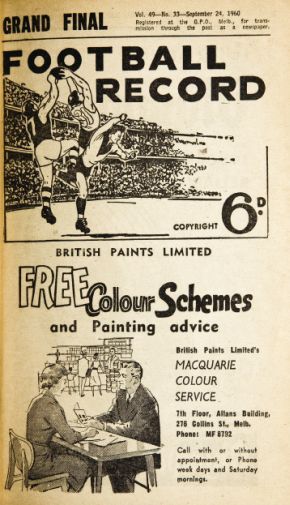
1960
Once more the Demons finished top, this time in front of the Fitzroy side coached by Norm Smith's brother. The brothers faced off in the Semi Final but despite his side being fancied as the 'next big thing' in the VFL Len received no favours with his side thumped by 62 points. The Lions then lost the preliminary final by five points and it was Melbourne vs Collingwood again. The chance for revenge over 1958 had come a year later than expected.
The Demons went into the match as overwhelming favourites, especially after the Pies had been forced to play their preliminary final in terrible conditions the week before. Grand Final day was no better, heavy rain had lashed Melbourne for two days and the ground was in atrocious state.
Some thought the conditions might be a leveller, but right from the start Melbourne gave the Pies no chance. They dominated with perfect wet weather football and had what would probably be a match winning lead in the conditions at quarter time. Determined not to be sucked into fights like they were in the 1958 Grand Final the Demons kept their cool. Even when Ron Barassi was punched in the face at a boundary throw-in they didn't retaliate. In 2003 Barassi revealed that he still suffered pain from the blow more than 40 years later because of nerve damage.
The Pies got their first goal early in the second term, but even that was lucky - Tassie Johnson dropped an easy mark which allowed Ray Gabelich to convert. Their other goal came from a shot that barely made the distance from 45 yards - and even that was disputed by the Demons who believed it had been touched on the line. They had just six shots on goal for the entire day. Constant pressure destroyed the old enemy. It was the lowest Grand Final score since Richmond kicked one goal in 1927.
Best were Mithen, Lord and Mann
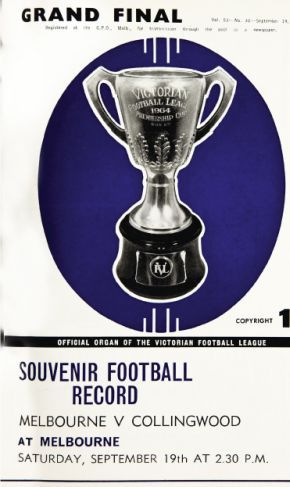
1964
The purest glory years had by now passed the Demons who had settled into a solid finals contender rather than the outstanding superstar team of the competition. They still finished top of the ladder in 1964 but it was one of the closest final fours ever - with fifth placed Hawthorn just a game behind the minor premiers and Melbourne just half a game and percentage out of fourth.
Pitched into a Semi Final against second placed Collingwood, Melbourne unexpectedly destroyed them by 89 points to win straight through to the decider. Collingwood were forced into a preliminary final against the defending premiers Geelong where they triumphed by just four points.
After their thumping win in the semi the Demons entered the match as red hot favourites but Collingwood showed they had learnt some lessons from a fortnight previous, matching their opponents with a ferocious attack on the ball. Despite their last start victory there were still questions over Melbourne, they were weak in the ruck and if Graham Wise was beaten they were short on other options.
The Demons won the toss and kicked with a slight breeze, but the Pies were on top in the opening minutes and goalled first. Both teams were showing Grand Final nerves and the early play was scrappy. John Lord equalised for the Demons, and his side soon took the lead. All the goals were kicked by the eight minute mark of the quarter and the rest of the term was spent with the sides locked in an arm wrestle for territory which ended with Melbourne leading by a point.
The two sides only had themselves to blame for the tight score, when Barrie Vagg booted a point early in the second term it was the 12th consecutive behind of the match. Melbourne had turned the tables and were playing better football but it took until the ten minute mark for them to finally break the goalscoring drought. After battling so hard for the breakthrough, the Demons capitalised almost immediately with a second goal for the term. That was the cue for the Pies to spark and they poured on three goals to the end of the term to take a narrow two point lead into the second half.
An early goal in the third settled the Demons, then like the first quarter the game degenerated into a tense struggle. There were no more goals kicked until the 22 minute mark when Barry Bourke converted on the run. Melbourne took an eleven point lead into the final term and the Magpies were visibly tiring.
Melbourne sides had run away in Grand Finals before and after three behinds in a row to open the quarter and extend the lead to 14 points it looked like only a matter of time before the Demons put the match beyond doubt. Despite the early domination it was the supposedly tiring Pies who got the first goal of the quarter five minutes in to cut the margin. Melbourne missed another pair of shots on goal and left the door open for their opponents who reduced the margin to three points after Ray Gabelich goalled from a boundary throw-in.
Gabelich's second goal put the Magpies in front. The 193cm ruckman took the ball and had four bounces, nearly losing control before goalling from the square to put his side in front. It was too early to shut up shop, but the Pies suddenly had all the momentum. Straight from the bounce Barry Bourke found Hassa Mann 20m out almost directly in front but amazingly Mann missed - the Pies led by two.
23 minutes into the term Brian Dixon - guilty of many turnovers throughout the day - found himself with the ball at left half-forward. He roosted it towards the goals, and as the ball was thumped from the pack it landed in the arms of back pocket Neil Crompton who threw it onto his boot. The kick somehow managed to float through and put the Demons back in front. Had he followed the instructions of Norm Smith, Crompton would never have been there - he had followed his opponent up the ground.
The Pies still had time to win it. Ian Graham managed to miss everything when well in range, and was then denied what Collingwood fans throught was a sure free kick near goal. Melbourne held on to win, Hassa Mann breathed a sigh of relief that he hadn't cost his side a premiership and Melbourne went on to 45+ years of flag wilderness.
Norm Smith described the final term as "the most agonising I have ever experienced in football".
Best were Adams, Dixon and Tassie Johnson.
100 Years of Grand Final Records is available from April 27. Price $400. Click here for more details. And no, sadly I didn't pocket a freebie for doing this post. You'll only know something suss is taking place if they suddenly end up publishing one of the many half-thought out concepts I've come up with for MFC books over the years.




excellent work
ReplyDeletewe need 12 good news stories today to cover the torment everywhere else.
go dees.
lets at least play football at subi.
have shots! shoot! run! SHOOT!
:-)
TC